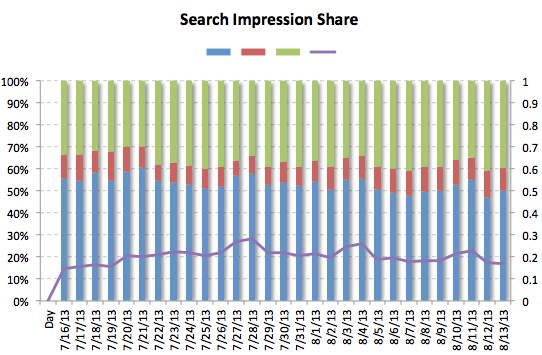Some of my favorite topics on this blog deal with case studies analyzing account performance in painstaking detail. It makes sense – this is an intensely data-driven line of work, often requiring hours of analysis. But it’s important that we don’t lose sight of the other facets of this job, like long-term account strategy, expansion, and (in this case) how to have a great PPC business review.
This past week, I had a stellar client visit that featured a deep-dive analysis of our progress in PPC so far this year. It went so well that I had to take a step back and analyze why it was so constructive, and what both parties brought to the table to make it so. These were just a few of my observations, so if you have any experiences you’d like to share about your own meetings, leave a comment below!
So, to start:
1. Have a plan, and then have another backup plan or two.
Whether you’re in-house or agency, it’s important to be prepared for these meetings. Have ideas ready to bring to the table for further expansion, better optimization, or (if needed) course correction. In past quarterly meetings our topics have ranged from routine ad tests to entirely new Landing Page tests, new geographic location targets, language targets, and new advertising platforms. The most recent meeting featured talks on Product Listing Ad expansion, product expansion, Impression Share/Budget Analysis, Facebook, AdRoll, and backend lead tracking integration. It was pretty exhaustive.
Basically, don’t be complacent when it it comes to suggesting new features and techniques to try, especially when they’re in line with your long term strategy for the account. This should be done regardless of performance – but doubly so if course correction is needed.
2. Provide context for account performance, don’t just go through a rote task list.
One of the biggest mistakes you can make is to believe that merely reciting your accomplished tasks is enough to prove your value. “Well, we did X, Y, and Z” isn’t enough. For the most part, none of us are measured by “tasks completed”. We’re measured by the goals we’ve achieved. Always be mindful of how you impact the bottom line.
When you discuss the strategies you’ve implemented, try to provide context and insight as to why those tasks were performed, what the desired outcome was, and what the actual results were. There’s a difference between:
“This quarter, we launched in Bing.”
Or:
“This quarter, we launched in Bing as part of our overall expansion strategy. In doing so, we were able to generate 33% more leads at 20% cheaper CPA due to Bing’s noticeably cheaper Cost Per Click.”
Remember, you’re the PPC professional. Your job is to provide context for your superiors/clients by using your expertise, in addition to implementing your ideas. Don’t assume that all parties have the knowledge to understand how your tasks fit in to the grand scheme of things!
3. Have your chargers (and other tools) at the ready.
True story – I’ve had my laptop die on me mid-visit before. You can bet I didn’t make that same mistake twice. Be prepared with whatever tools you might think you’ll need – this past visit, I brought a projector on a hunch that I might need it. Turns out, that was the correct call.
4. Know your account(s) forwards and backwards.
This goes without saying, but getting blindsided on account performance, especially by someone without any PPC knowledge, is a bad thing. Dot your T’s, cross your I’s, and know exactly what’s going on in your account. Be prepared to speak to it if called upon. This past meeting, we had a brief discussion about some image ad tests that this client was highly invested in – you’d better believe that I knew the exact performance metrics going in to that meeting.
5. Great slide decks help. Great reports help more.
This isn’t an either/or choice. You should have both ready to go, but keep point #2 in mind: you’re always looking for ways to provide context and understanding.
This past meeting, one of the biggest wins came from an analysis of our Impression Share over the last 90 days. We’d correctly anticipated that this would be a topic that might come up, so I took a couple hours prior to the visit to put it together. We were able to show exactly where we were limited by our budget and rank across all our campaigns and, in doing so, were almost immediately granted a substantial budget increase.

This particular report was dependent on our client’s comfort level with lots of data, so be mindful of that consideration going in. However, a great report can help guide your discussion and provide some much-needed perspective on your PPC campaigns.
6. “Close the loop.”
One of the biggest wins we came away with at this meeting had to do with the groundwork put in place to measure our success months before. If you don’t have backend lead tracking like Salesforce/Hubspot, or the ability to track your profit and revenue via Analytics, then it becomes much harder to justify any initiatives whatsoever. Know how your conversions are being tracked at every step of the process – that accountability can help you immeasurably going forward.
These were just a few observations that I’ve put together from this last meeting. It helped us to cement an already great relationship, and the message (I hope) is pretty universal across all corners of our industry. But if you have any other tips, talking points, and tactics you employ to survive your own PPC meetings, let us know in the comments! Thanks for reading!



